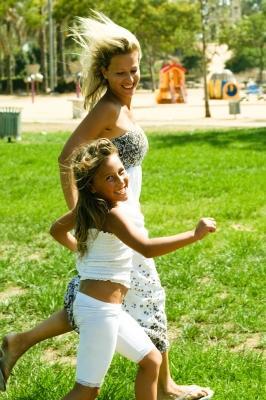I frequently find myself thinking, “they (i.e. other moms) should know better than that”, or “isn’t that a bit rude?”, or “I can’t believe they think that’s okay”. Maybe since I’m older, I was brought up when there were certain social graces that everyone knew to follow. But now, many moms behave in ways that I can’t always condone. Here are ten ways to tactfully dealing with your child’s social interactions:

1. Party etiquette: If your child is invited to a child’s birthday party, some reciprocation is expected (especially if your child attends the party). If they invite you, you should invite them. Yes, I know that some parents need to keep parties small for financial reasons, but if that’s the case, have a party in your back yard or basement. Kids just want to run around and have some fun.
RSVP to party invitations as soon as possible. Don’t show up without an RSVP – if you don’t know if you can make it, let them know that as soon as you can. Parents throwing the party don’t know how many party bags to make, etc. If you RSVP to say you are coming, then come! If some emergency arises, call the other parent to let them know as soon as you can. Additionally, if your child is invited to a party, that doesn’t mean all of their siblings may attend as well. The invitation is to the child whose name is on the envelope. If it is an electronic invitation which is sent to the parent’s email, clarify which child or children should attend.
If your child attends a birthday party, don’t show up empty handed. A gift is expected (unless donations to a charitable organization are requested instead). There are plenty of gifts under $5 that children are happy with. Browse around the dollar store as a last resort.
2. Play date etiquette: Play dates should also be reciprocated. If you can’t host a play date at your house, go to the park.
If another momasks if you want a play date, get back to them right away. Don’t leave them hanging wondering if it’s a yes or no. If you don’t know your schedule, tell them that.
If you have a young child, always offer to stay for the play date, especially if your child has separation anxiety or if you know they can be a “handful”.
3. Playground etiquette: Younger children should have a parent or sitter present while at the playground. If your child needs help on the equipment, the parent or sitter should be the one helping, not the other moms or dads. I’ve seen some parents and nannies who let the kids run wild on the playground while they sit and talk on their cell phone completely ignoring what’s going on. Once while at an indoor mall playground, a little boy sat with us for 15 minutes (I gave him a snack because he asked for one) and the nanny was no where to be found. I had no idea who the boy belonged to, but finally a young girl looking embarrassed came to claim the boy. This was a small enough playground that if she were there, she would have seen him with us (I guess she had some shopping to do – ahem!)
4. Don’t gossip about other children to other moms. Gossip is downright wrong no matter who its about. If you have a real issue with a certain child, call their mom directly and discuss it. Nobody else needs to know or hear about the problem.
5. Don’t tell other moms how to raise their kids. If you have a problem with another child and it must be brought to the attention of their mother, do so tactfully. What works for one child doesn’t necessarily work for another so leave out the part of how you would handle it or what you do with your kid. Refrain from lecturing other mothers on how you enforce rules, how you require they eat their meals and so on. The vast majority of mothers out there do a completely adequate job of raising their kids. Unless you are truly concerned about a child’s welfare, don’t get involved.
6. Don’t comment on another child’s physical appearance. This is common sense, right? Apparently, not to some people. Refrain from commenting on how tall another child is, how short another child is, how heavy or thin a child is, etc. Chances are, if a child is very large or very small, it could be something the mother and/or child is sensitive about. Your comments only state the obvious and lead to embarrassment or hurt feelings. Keep it to yourself!
7. Don’t discipline other children. If you are at the park or an area where a lot of kids are playing, and a child does something that is clearly not okay, do your best to find their mom and discuss it. If you can’t find the other mother, nicely approach the child and say “Honey, my son/daughter doesn’t like it when you push, can you be a little more gentle with them?” or “My child just got that bike for Christmas and she’s not ready to have anyone else ride it yet”. I was actually at a park when one child started riding another child’s bike and the mother of the bike owner screamed, “THAT’S NOT YOUR BIKE, GET OFF!” On another occasion, I heard one mother say to a child (not hers) “you need to learn how to share”, the child’s mother was sitting right there and raised her eyebrows at the comment. I know there are times when you wish a child’s mother would take certain actions, but that doesn’t give you the right to take those actions for them.
8. Don’t discipline your own child in front of other kids (or parents). Yes, I know there are times you need to tell your child to stop doing something, but whenever possible, pull them aside and tell them by whispering. Constantly yelling or reprimanding your child publicly may give other kids “license” to do the same. This can lead to other kids ganging up on yours or other parents labeling your kid as a troublemaker. Another option for less urgent matters is to bring it up and discuss it once you are home alone. Likewise, don’t announce to others that your child is grounded or “in trouble”. If grounding is part of your discipline, simply tell others that your child can’t make it that day.
9. Don’t Brag. Period. If someone asks you about one of your child’s accomplishments, answer honestly and don’t embellish. I realize parents (and grandparents) feel like they’ve earned bragging rights, but its annoying and it makes other parents and kids feel inferior. That’s actually one reason other kids may not want to hang out with yours. Your child’s accomplishments will stand on their own. Teach your child not to brag…they will be more respected if they don’t constantly sing their own praise.
On the same note, don’t brag to other parents about all the parties, play dates, or fun things your child is doing or going to do. Teach your child not to talk about play dates or parties with other children. If the child they’re talking to isn’t invited, it leads to hurt feelings – nobody likes to be left out. This not only hurts the child, it hurts the mother too.
10. If your child goes to the movies, pool, or any other place where there is a charge for admission (even if they are invited by another child) – send them with enough money to cover admission and perhaps a snack. Unless it’s a party, don’t assume the other parent is going to cover the cost. They may refuse the money, but you should always offer.
About the Author

Article Source: http://EzineArticles.com/6671714
Image courtesy of [imagerymajestic] / FreeDigitalPhotos.net

